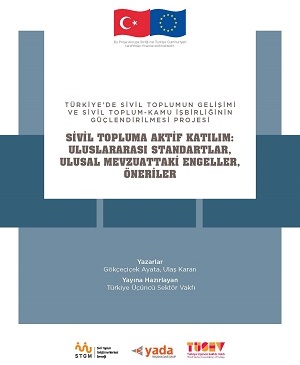Publicity Meeting: "Report of Active Participation in Civil Society", 18 November 2015

"Report on Active Participation in Civil Society: International Standards, Obstacles in National Legislation, Recommendations" publicity meeting was held on 18 November 2015. This report is prepared in scope of the Strengthening Civil Society Development and Civil Society-Public Sector Dialogue in Turkey Project financed by the European Union and the Republic of Turkey of which the Third Sector Foundation of Turkey (TÜSEV) is an implementing partner. The report is written by İstanbul Bilgi University Human Rights Law Research Center Expert Researcher Gökçeçiçek Ayata and İstanbul Bilgi University Faculty of Law Assistant Professor Ulaş Karan.
The report aims to identify the legal obstacles on active participation in civil society in Turkey and presents recommendations to overcome these obstacles. This study thatseeks to promote active participation is prepared with a comparative perspective in light of international standards. In identifying obstacles that stem from national legislation and provisions that forestall or hinder participation in civil society, the first consideration was how freedom of association is defined and restricted in international documents, case law issued by international mechanisms and in European Union standards. The freedom of association provides protection for numerous forms of organizations including political parties, unions and civil society organisations. However, in scope of this report the focus is specifically on associations and foundations as non-governmental organisations.
The report comprises three sections. The first section outlines standards of the freedom of association emerging from international human rights law. The freedom of association is a right that should be regulated in constitutions in the first place, and be safeguarded in concrete legislation to follow. Therefore, in the framework of the human rights dimension of the freedom of association, firstly the scope of the freedom of association in international law, and the extent to which the Republic of Turkey‟s Constitution complies with this scope were addressed. The second section of the report addresses issues of freedom of expression, right to information and right to assembly, hate speech and access to justice, which come to the fore in conjunction with the freedom of association. For the above mentioned issues, once again the Constitution was compared with international standards. The right to information, freedom of assembly, and access to justice were assessed in the third section of the report in scope of the legislation that pertains specifically to these issues. Finally, certain emerging issues in scope of the freedom of association were identified in the report and the corresponding provisions in Turkey‟s law were discussed. Here, legal texts that may be regarded as secondary legislation such as bylaws, regulations, statutes, circulars were excluded from the analysis and an evaluation was made on laws.

